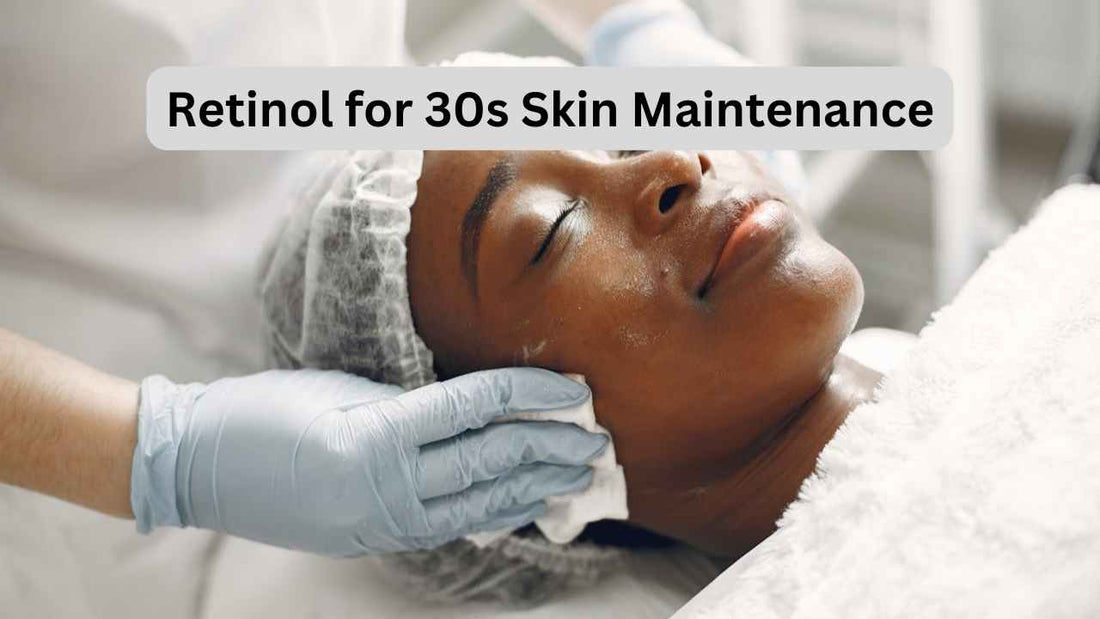
Retinol for 30s Skin Maintenance
Share
Your Guide to Age-Defying Care

As we enter our 30s, we often begin to notice changes in our skin, such as the development of fine lines and a decrease in collagen production. These changes call for a shift in our skincare regimen to maintain a youthful and healthy complexion.
Retinol, a derivative of vitamin A, has been celebrated for its ability to accelerate skin renewal, boost collagen production, and reduce the appearance of aging signs.
Incorporating retinol into our skincare routine can make a significant difference in how our skin copes with the natural aging process. It's important to choose a retinol product that complements our skin type to maximise benefits and minimise any potential irritation.
With consistent use, retinol can smooth out fine lines and contribute to a firmer skin texture, making it a staple ingredient for 30s skin maintenance.
Key Takeaways
- Retinol supports skin renewal and collagen production, essential in the 30s.
- Selecting the right retinol product is critical for compatibility with one's skin type.
- Regular use of retinol can minimise signs of aging and improve skin firmness.
Retinol Products for 30s Skin Care
In our 30s, our skin's collagen production begins to slow and signs of aging may appear.
Retinol, a potent form of vitamin A, helps to counteract these changes by boosting collagen and promoting elasticity.
Understanding Retinol and Its Derivatives
Retinol, a type of retinoid, is derived from vitamin A and aids in the renewal of skin cells. It is not as potent as prescription retinoids such as tretinoin or adapalene, but it still effectively supports collagen production.
Retinal and retinaldehyde are other forms that offer similar benefits, with retinaldehyde being a step closer to the prescription-strength results.
Choosing the Right Retinol Product
For your 30s, consider the concentration and potency of the active ingredients in retinol serums and creams.
Over-the-counter options range from gentle formulations to higher concentrations that approach prescription-strength.
Those with sensitive skin may benefit from encapsulated retinol, which releases the active ingredient over time to minimise irritation.
Incorporating Retinol into Your Skincare Routine
Begin by applying a pea-sized amount of retinol cream or serum to clean, dry skin, followed by a moisturiser to keep skin hydrated.
As retinol can increase your sensitivity to the sun, always follow up with a broad-spectrum SPF in the morning.
Managing Retinol Side Effects
You may experience dryness, redness, or flakiness when first using retinol.
To manage, pair retinol with hyaluronic acid to boost hydration or use soothing ingredients like ceramides, glycerin, and chamomile to calm irritated skin.
Lifestyle Considerations and Professional Advice
Consult with a dermatologist or aesthetician to tailor retinol use to your unique skin, especially if you have eczema or rosacea.
It's crucial to also consider lifestyle factors such as stress and risks during pregnancy when choosing skincare products.
Alternatives to Retinol
For those unable to use retinol, alternatives like bakuchiol, peptides, and vitamin C offer anti-ageing benefits.
Niacinamide, squalane, and antioxidants like vitamin E can improve skin's appearance without irritation.
Advanced Skin Care Practices
In advancing through our thirties, we recognise the necessity for an evolved skin care regimen to counteract the early signs of ageing. Our focus lies on enhancing collagen production, maintaining elasticity, and reinforcing the skin barrier for a vibrant and youthful complexion.
Combating Advanced Signs of Aging
As we age, collagen and elastin — the building blocks of our skin — begin to deplete, leading to wrinkles and a loss of plumpness.
Nightly use of products such as a retinol youth renewal night cream can stimulate collagen production and accelerate cell turnover, helping to smooth fine lines and enhance skin firmness.
Leveraging Additional Skincare Ingredients
To bolster our skin's resilience, we incorporate hyaluronic acid for hydration, niacinamide to improve skin barrier function, and vitamin C for its antioxidant benefits.
These ingredients, alongside bakuchiol, a natural alternative to retinol, work synergistically to reduce hyperpigmentation and brighten the complexion.
Enhancing Skin Texture and Tone
Regular exfoliation with gentle acids like glycolic or lactic acid can significantly improve skin texture, aiding in the reduction of enlarged pores and blemishes.
For those of us with hyperpigmentation or dark spots, consistent application of targeted treatments can help fade these signs of sun damage.
Nurturing Skin Barrier and Health
Maintaining a robust skin barrier is paramount; ingredients such as ceramides, glycerin, and squalane serve as excellent emollients to fortify this defence.
Daily application of a broad-spectrum SPF prevents further damage, while ceramides and peptides work behind the scenes to support our epidermis and prevent dryness.
The Role of Professional Treatments
For tailored guidance and advanced treatments, we often turn to our dermatologists or aestheticians.
In-office procedures such as laser therapy, chemical peels, or microneedling may be recommended to accelerate our journey towards a more refined and resilient skin, further enhancing the work we do at home.
